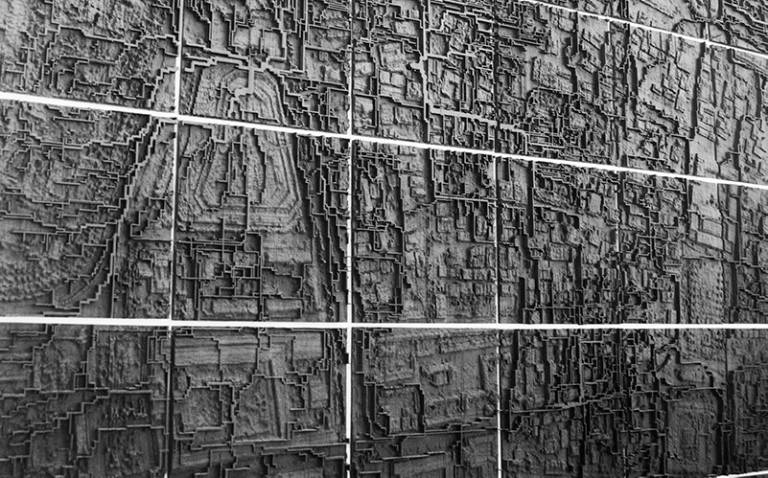Bio-Computational Symposium
27 November 2019, 1:00 pm–3:00 pm

Panel discussion about the link between human and non-human intelligences, architecture and urban design.
Event Information
Open to
- UCL staff | UCL students
Availability
- Yes
Organiser
-
Drew Pessoa02031087337
Location
-
Room 5.0422 Gordon StreetLondonWC1H 0QBUnited Kingdom
About
The Bio-Computational Symposium is organised by Claudia Pasquero, Emmanouil Zaroukas and Filippo Nassetti from The Bartlett School of Architecture's Urban Morphogenesis Lab. The symposium offers a platform for presentation, discussion and theoretical reflection upon the link between human and non-human intelligences, architecture, and urban design.
The conversation emphasises the key role that uncanny modes of thinking and intelligence, both biological and computational, play within complex design synthesis and their spatial, cultural and political implications.
Speakers discuss urban networks designed by biological forms of intelligence and buildings colonised by living microbes. Guests are encouraged to discuss these topics in a transdisciplinary mode, addressing academia, practice and beyond.
Schedule
13:00 Claudia Pasquero – Polycephalum City
13:30 Rachel Armstrong – Towards Programmable Building Infrastructure
14:00 Timothy Ireland – Between Life and Architecture
14:30 Liss C. Werner – The Ecology of Design Cybernetic, a Sixth Ecology Talk
15:00 Closing remarks – Emmanouil Zaroukas
Speakers
- Claudia Pasquero
Claudia Pasquero is an architect, author and educator. She is Co-founder and Director of ecoLogicStudio, Director of the Urban Morphogenesis Lab, Lecturer at The Bartlett, and Senior Tutor at the IAAC in Barcelona. Her work is carried out at the convergence of disciplines such as biology, computation and urban design; her projects have been exhibited internationally in Karlsruhe (ZKM Collection, 2015), Milan (EXPO, 2015), Orleans (FRAC Collection, 2014), Paris (EDF Foundation, 2013), London (Architectural Association, 2011), Venice (Biennales 2006, 2008, 2010, 2015, 2016) and Astana (EXPO, 2017).
Claudia is co-author of 'Systemic Architecture: operating manual for the self-organizing city', published by Routledge in 2011. Claudia was the Head Curator of the Tallinn Architectural Biennale 2017, titled bioTallinn.
- Rachel Armstrong
Rachel Armstrong is Professor of Experimental Architecture at the School of Architecture, Planning and Landscape, Newcastle University. Her work explores how our buildings can incorporate some of the properties of living systems to become 'living architectures'. She was coordinator for the FET Open Living Architecture project (April 2016 – June 2019) and coordinates the EU Innovation Fund ALICE project. She is a Rising Waters II Fellow with the Robert Rauschenberg Foundation (April – May 2016) and a 2010 Senior TED Fellow. She is also a Member of the Hub for Biotechnology in the Built Environment at Newcastle University and Director and founder of the Experimental Architecture Group (EAG) whose work has been published and exhibited internationally.
- Timothy Ireland
Timothy Ireland is Senior Lecturer at Kent School of Architecture and Planning. He is a UK registered architect who, having worked in small-scale private and large-scale international practices in the UK and overseas turned to focus on his interests in natural systems and computation. He completed his PhD (2013) in Architecture & Computational Design at The Bartlett.
Tim’s research is a synthesis of algorithmic and biological design thinking. Taking an interdisciplinary approach his research is a combination of synthesising several different strands of theoretical work on conceptualising, representing and analysing space and spatiality, and developing computer codes that simulate bio-inspired spatial self-organisation. The purpose of these two endeavours is to probe and improve the concept of space for architectural practice, and make a case for the use of such computational tools as creative stimuli for early-stage design processes. Understanding space to arise from the interplay of dynamic habitual agencies, he proposes architects may benefit from embracing a decentralised approach to configuration in order to mediate and articulate inhabitation.
- Liss C. Werner
Liss Werner is a registered architect, director of Tactile Architecture and Assistant Professor at TU Berlin, Institute of Architecture, where she is the founder and Lab Leader of the CyPhyLab, Cyber-Physical Systems in Architecture and Urban Design.
Prior to this Liss held positions as guest professor at Carnegie Mellon University, Adjunct Associate Professor at Taylors University, Malaysia, Lecturer at Innsbruck University and studio Master at Nottingham University and DIA, Dessau International graduate Architecture School. She has lectured at MIT, Cooper Union, Texas Tech, ESARQ. Liss is an Independent Expert Evaluator for the European Commission for Horizon 2020 and chair of eCAADe2020 hosted by TU Berlin. Her field of research is ‘architecture and cybernetics’.
- Emmanouil Zaroukas
Emmanouil Zaroukas holds a diploma in Architecture from Aristotle University of Thessaloniki. He is an architect, researcher and educator and is currently completing his PhD at University of East London, where he explores the creative capacities of artificial neural networks and machine learning in architectural and urban design.
Access
All our event spaces are accessible. For any additional support or information, please email or call 020 3108 7337.
Image: Student work from Research Cluster 16, Urban Design MArch, The Bartlett School of Architecture.
 Close
Close

